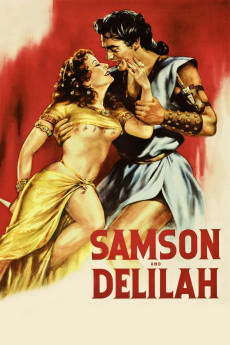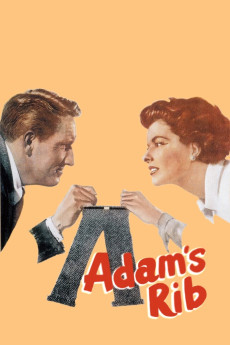

Samson and Delilah (1949) – Academic and Psychological Review
Plot Summary
‘Samson and Delilah’ (1949) is an epic biblical drama directed by Cecil B. DeMille. The film tells the story of Samson, a Nazirite with superhuman strength, and his tumultuous relationship with Delilah. The narrative follows Samson’s exploits against the Philistines and his ultimate downfall due to Delilah’s betrayal, culminating in a final act of redemption and sacrifice.
Characters and Acting
The film stars Victor Mature as Samson and Hedy Lamarr as Delilah. Mature’s portrayal of Samson captures both the physical prowess and internal conflict of the character. Lamarr delivers a memorable performance as the seductive and treacherous Delilah, bringing complexity to her role. The supporting cast, including George Sanders and Angela Lansbury, add depth to the story with their strong performances.
Direction
Cecil B. DeMille’s direction is grand and meticulous, reflecting his reputation for epic storytelling. DeMille’s vision is evident in the film’s elaborate set pieces and sweeping cinematography. His ability to balance action, drama, and romance makes ‘Samson and Delilah’ a captivating cinematic experience.
Cinematography
The cinematography by George Barnes is visually stunning, with impressive use of Technicolor. The film’s visual grandeur is enhanced by striking compositions and dynamic camera movements. The vibrant colors and detailed set designs bring the biblical world to life, making it a feast for the eyes.
Music and Score
The musical score, composed by Victor Young, is a key element of the film’s emotional impact. The music underscores the epic nature of the story and enhances the dramatic tension. The score’s blend of orchestral grandeur and thematic motifs adds depth to the film’s narrative.
Themes
The central themes of ‘Samson and Delilah’ include faith, betrayal, and redemption. The film explores the consequences of Samson’s pride and the destructive power of love and deception. It also delves into the theme of sacrifice, highlighting Samson’s ultimate act of heroism in his final moments.
Screenplay and Dialogue
The screenplay, written by Jesse Lasky Jr., Fredric M. Frank, and Harold Lamb, is based on the biblical story of Samson and Delilah from the Book of Judges. The dialogue is rich and dramatic, reflecting the film’s epic tone. The script effectively captures the grandeur of the biblical narrative while adding depth to the characters’ interactions.
Special Effects
The special effects in ‘Samson and Delilah’ are impressive for their time, particularly the sequences showcasing Samson’s feats of strength. The destruction of the Philistine temple is a standout moment, achieved through a combination of practical effects and elaborate set design. These effects enhance the film’s epic scale and contribute to its visual impact.
Editing and Pacing
The film’s editing, by Anne Bauchens, is seamless and well-paced. The narrative flows smoothly, balancing action sequences with character-driven moments. The pacing maintains the audience’s interest throughout, building to the climactic final act with increasing tension and drama.
Production Design
The production design by Hans Dreier and Walter Tyler is lavish and detailed, capturing the grandeur of the biblical setting. The sets and costumes are meticulously crafted, contributing to the film’s epic atmosphere. The attention to detail in the production design immerses the audience in the ancient world of the story.
Historical Accuracy
While ‘Samson and Delilah’ takes some creative liberties with the biblical source material, it remains faithful to the overall narrative. The film’s depiction of the period is convincing, with careful attention paid to historical details in the settings, costumes, and cultural practices. This historical authenticity adds to the film’s immersive quality.
Overall Impressions
‘Samson and Delilah’ is a visually spectacular and emotionally engaging film. The strong performances, grand direction, and impressive production values make it a memorable entry in the epic genre. The film’s exploration of timeless themes and its blend of action and drama ensure its enduring appeal.
Rating and Recommendation
I would rate ‘Samson and Delilah’ a solid 8 out of 10. The film is a must-watch for fans of epic dramas and those interested in biblical stories. Its combination of visual grandeur and emotional depth makes it a standout film of the 1940s.
Cultural Impact
The cultural impact of ‘Samson and Delilah’ is significant, as it set a new standard for biblical epics in Hollywood. The film’s success paved the way for other grand-scale biblical adaptations, influencing the genre for decades. Its themes of faith, betrayal, and redemption continue to resonate with audiences, making it a timeless classic.
Genre Analysis
‘Samson and Delilah’ fits well within the genres of drama, romance, and historical epic. It adheres to the conventions of these genres while bringing a unique depth to its storytelling. The film’s blend of action, drama, and romance, combined with its biblical setting, makes it a quintessential example of the epic genre.
Comparative Review
When compared to other biblical epics, ‘Samson and Delilah’ stands out for its strong character development and emotional depth. While many films in the genre focus primarily on spectacle, this film balances its grand visuals with compelling storytelling. It can be compared to other epic films like ‘The Ten Commandments’ (1956) and ‘Ben-Hur’ (1959) for its blend of action, drama, and historical authenticity.
Audience Reception
‘Samson and Delilah’ was well-received by audiences upon its release, praised for its visual spectacle and strong performances. The film was a box office success, becoming the highest-grossing film of 1950. Audience reactions have consistently highlighted the film’s ability to combine epic storytelling with emotional resonance.
Narrative Structure
The narrative structure of ‘Samson and Delilah’ is linear, following the chronological events of Samson’s life. This straightforward approach allows for a clear and engaging storytelling experience. The film effectively builds tension and drama, leading to the climactic destruction of the Philistine temple.
Philosophical Analysis
The film poses several philosophical questions about faith, power, and the human condition. It explores the consequences of pride and the corrupting influence of power. The characters’ struggles with their desires and moral dilemmas provide a rich ground for philosophical reflection.
Technical Analysis
Technically, ‘Samson and Delilah’ is a masterpiece of 1940s cinema. The sound design, led by Loren L. Ryder, enhances the film’s immersive quality, with attention to detail in the depiction of action sequences and ambient sounds. The lighting and color grading add to the film’s visual appeal, creating a vivid and engaging experience.
Subtext and Interpretation
Beneath the surface, ‘Samson and Delilah’ explores themes of power, manipulation, and redemption. The relationship between Samson and Delilah serves as a metaphor for the struggle between strength and vulnerability. The film’s subtext also delves into the concept of divine justice and the idea that true power comes from faith and humility.
Director’s Previous Work
Cecil B. DeMille, known for his grand epics, brings his signature style to ‘Samson and Delilah.’ Comparing this film to his other works, such as ‘The Ten Commandments,’ showcases his ability to blend spectacle with deep storytelling. DeMille’s direction in ‘Samson and Delilah’ is a testament to his mastery of the epic genre.
Literary Adaptation
‘Samson and Delilah’ is based on the biblical story from the Book of Judges. The adaptation remains faithful to the core narrative while adding depth to the characters and their relationships. The film successfully translates the epic tale into a compelling cinematic experience, making it accessible to a wider audience.
Academic Review
From an academic perspective, ‘Samson and Delilah’ provides a rich text for analysis. The film’s narrative structure, character development, and thematic depth offer valuable insights into biblical storytelling and its adaptation to the screen. The portrayal of Samson as a flawed hero and Delilah as a complex antagonist adds layers of complexity to the story.
The film’s exploration of themes such as faith, betrayal, and redemption makes it a significant subject for academic study. It addresses the psychological impact of power and the moral dilemmas faced by its characters. The film’s historical and cultural context provides a deeper understanding of its narrative and themes.
Academically, ‘Samson and Delilah’ can be analyzed through various theoretical frameworks, including feminist film theory, psychoanalysis, and historical criticism. The film’s depiction of gender dynamics, power relations, and the struggle for redemption offers a rich ground for scholarly exploration.
Overall, ‘Samson and Delilah’ stands as a significant work in the canon of biblical epics, offering valuable insights into the adaptation of ancient texts to modern cinema. Its combination of visual spectacle and emotional depth makes it a compelling subject for academic analysis.
Psychological Review
The psychological review of ‘Samson and Delilah’ delves into the emotional and mental states of its characters. Samson’s internal struggle with his superhuman strength and the responsibilities it entails is a central focus. His relationship with Delilah is marked by manipulation, betrayal, and a quest for redemption, offering a complex psychological dynamic.
Delilah’s character provides insight into the psychological effects of power and seduction. Her motivations are driven by a desire for control and revenge, reflecting deeper psychological themes of manipulation and deceit. The film portrays her as both a victim of her circumstances and a master manipulator, adding layers to her character.
The film also explores the psychological impact of betrayal on Samson. His initial trust in Delilah and subsequent realization of her betrayal lead to a profound emotional and psychological transformation. This arc highlights the destructive power of deceit and the possibility of redemption through sacrifice.
Psychologically, ‘Samson and Delilah’ addresses themes of pride, guilt, and the search for meaning. Samson’s journey from a proud warrior to a humbled servant of God underscores the psychological and emotional growth of the character. The film’s portrayal of his final act of sacrifice is both a physical and psychological redemption.
Overall, ‘Samson and Delilah’ provides a rich text for psychological analysis, offering insights into the emotional lives of its characters and the broader human experience. The film’s exploration of power, betrayal, and redemption resonates on a deep psychological level, making it a timeless and compelling narrative.
Download Subtitles
To enhance your viewing experience, you can download the subtitles for ‘Samson and Delilah’ (1949) from the following link: Download Subtitles






